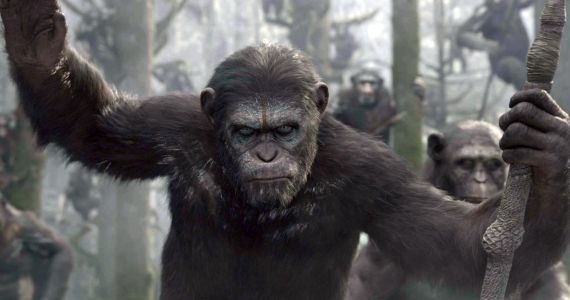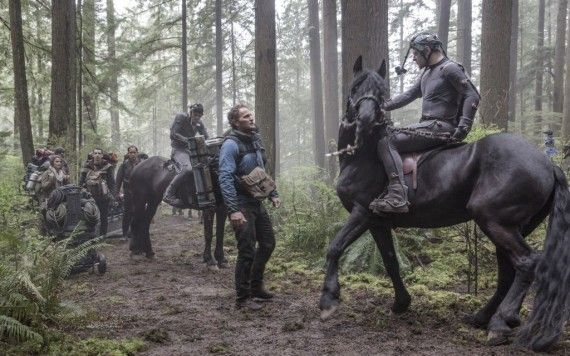At one time the concept of rebooting the Planet of the Apes series seemed like a longshot, but thanks to the success of Rise of the Planet of the Apes – due largely to the performance of Andy Serkis – Fox has revived the franchise, and will be taking things to an even larger scale with Dawn of the Planet of the Apes.
At Fox’s Comic Con 2013 press conference this week, director Matt Reeves and Serkis promised a human story despite their ape-filled cast, and gave a few hints of how an ‘ape kingdom’ will begin to form around Caesar’s new family.
Reeves confirmed that while some movie fans may be most familiar with (and therefore most interested in) a world ruled by smart apes, he felt the strengths of the first film were too important to cast aside just yet. There’s no mistaking the fact that Serkis’ turn as Caesar, the first intelligent ape and the newly-emerged leader of previously-imprisoned primates, was the heart of Rise. For Dawn, he remains the central figure, albeit in a much more fluid world:
“The thing that was important to me was that the story not jump too far, in a certain way, from where things were in Rise... When Andy says ‘NO!’ in Rise, I think it’s so startling; it blew me away. The thing that was exciting to me was watching the apes learn how to speak; watching all that happen. Obviously there’s only 3 or 4 words in the first movie -- we wanted this to be somewhere along the continuum toward the ’68 movie where, of course, they’re fully conversing.”
“The first film was shot much more on stage, it was a smaller scale film. This film - because of what they’re creating, this ape kingdom - is out in the woods. So we went out to the woods. I wanted to use as much available light as possible so we could create that kind of reality, and then of course the key to everything was just about the emotional reality of the characters that these actors play. Once you do that you forget about the fact that they’re apes.”
A central cast of mo-capped apes is intriguing enough to get plenty of attention from even casual observers, but fans need not worry about watching a two-hour long video of beating chests or grunting; Caesar may be the first ape capable of speaking to humans, but he won’t be the last.
According to Serkis, the Caesar fans will meet in Dawn of the Planet of the Apes is a changed being from the closing moments of Rise. But the human dilemmas and questions of identity that defined him in the previous film haven’t resolved themselves in the years since:
“Going through to this next stage, it’s very much about Caesar having become leader, and not throwing away everything that he has grown up with as a human being. So in a sense he’s both finding his inner ape by galvanizing this group of orangutans and chimps and gorillas - 2,000 strong – but also trying to evaluate on a daily basis, and not become absolute but be open and empathetic.
“He’s also a father now: he’s got a teenage son. He’s also now got an infant child, he has a wife. He has a council, he has a very, very big community that he’s responsible for, and their survival. And then he has the choice and reaction to human beings who he adores in a sense, and still, deep down, wants to be able to communicate with.”
Positioning Caesar as a parent and husband certainly promises an even richer arc for Serkis to tackle, but the implication of apes, orangutans and chimps forming marriages and ‘councils’ proves that the same experiments which drove his community to escape are continuing to make them more intelligent.
That intelligence promises new forms of dialogue for Dawn, and a slow march towards the ‘planet of the apes’ that lies in Earth’s future:
“This time around there is an evolution in linguistic terms… We worked in great detail in terms of creating that level of sophistication versus ‘finding’ language. So he communicates through the sign language, the American Sign Language that he was taught, which has become a unifying way of speaking with the other apes; also human words that he is beginning to be able to use.
“And then all of the other apes too are dealing with learning to use just gesture and ape vocalizations. And of course the younger apes who are growing up in this society are learning to speak better and faster than their parents, because that’s what happens.”
Reeves explained that although some research was done on ape behavior, a majority of the time was spent treating the characters as human. The process of ‘finding language’ holds particular promise for movie fans interested in the anthropological aspects of society-building, and the mixture of signing, ape body language and human speech sounds like a clever way of distinguishing characters from one another.
Serkis wouldn’t go into further detail concerning Caesar’s new family, but with the story told from the apes’ perspective, it seems more and more likely that the human characters will move into an antagonistic, if not villainous role. Additionally, a growing schism in ape society could also set the stage for the all-out warfare hinted at in the film’s Hall H panel, and the first official image from the film. A war in which Caesar’s attempts to keep the peace aren’t likely to be rewarded.
Expect more details concerning Dawn of the Planet of the Apes in the near future. For now, let us know what you think about this new ‘ape kingdom’ in the comments.
Dawn of the Planet of the Apes is out in theaters on July 18, 2014.
_____
Follow Andrew on Twitter @andrew_dyce.



